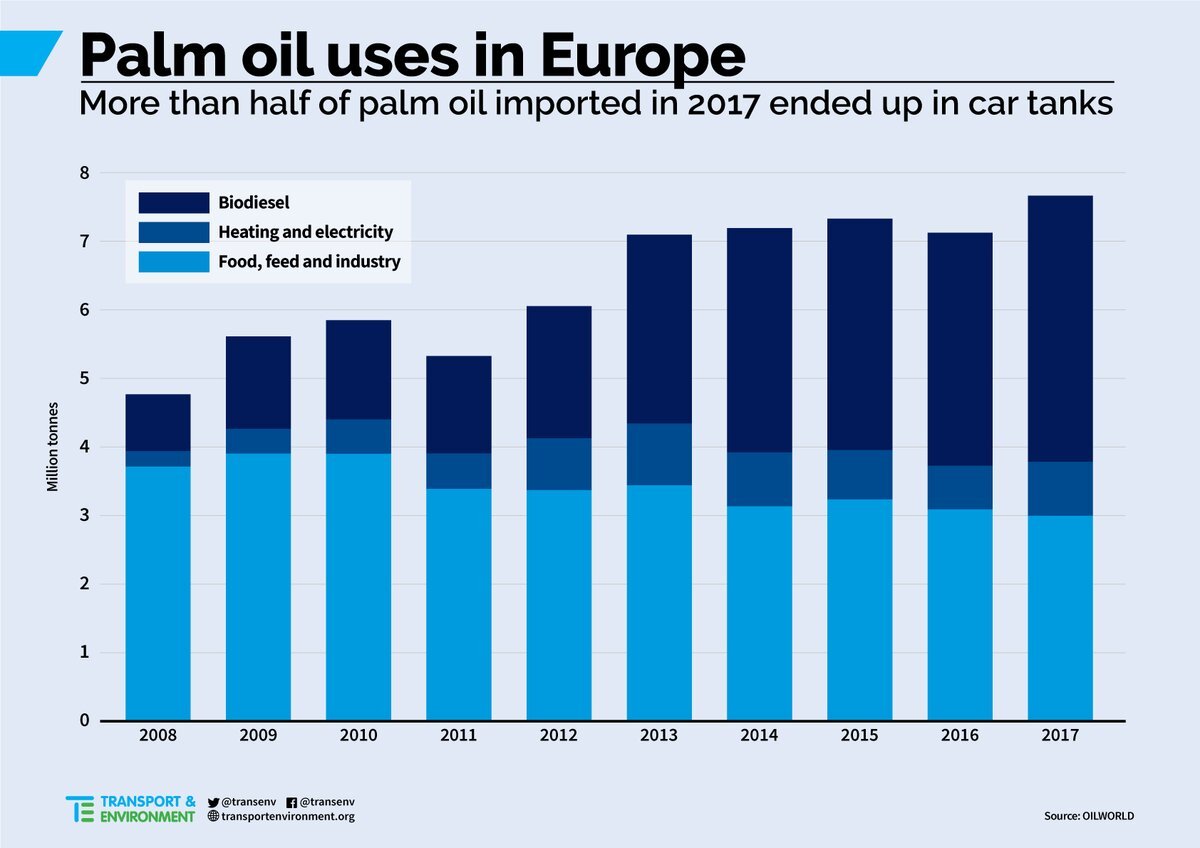
Interested in this kind of news?
Receive them directly in your inbox. Delivered once a week.
Europe’s federation of green transport NGOs, Transport & Environment (T&E), deplores these loopholes since they could mean Europe would keep using the same amount of palm oil in diesel that it does today. T&E stresses the fact that the size of a plantation has no relation to the risk of deforestation or the changes in land use. Moreover, small lots of land toiled by workers who sell to a single big mill controlled by corporations is the business model of palm oil giants like Malaysia’s FELDA/FGV, which produces more than half of its palm oil that way. Regarding ‘unused’ land, these areas may actually be currently used by local communities to support themselves or deliver important ecosystem services. Also, some of these areas may have been brought into production anyway to meet the ever-increasing demand for food. Overall, the act doesn’t provide sufficiently robust criteria nor a proper monitoring and enforcement system.
The majority of key studies modelling emissions from indirect changes in the use of land (ILUC) show that palm oil has higher ILUC emissions than any other feedstocks for biodiesel, followed by soy oil. The Globiom study for the European Commission revealed that biodiesel from palm oil is three times worse for the climate than regular diesel while soy oil diesel is two times worse. T&E deplores that the Commission arbitrarily exempted soy – a major contributor to deforestation worldwide – from the high ILUC risk category.
Laura Buffet, clean fuels manager of T&E, said: “The Commission sends an important signal by deciding that palm oil diesel is not sustainable. But it gives with one hand what it takes away with the other. You can’t label palm oil diesel as unsustainable, then open a loophole as big as the current consumption levels and think people won’t notice. This decision is arbitrary, breaks the mandate the Commission had gotten from ministers and the European Parliament, and ignores the massive public support for ending the palm oil diesel nonsense.”
Back in June last year, the EU Parliament and national governments agreed to progressively phase out the use of the highest emitting biofuels or “high ILUC risk” biofuels by 2030. In a concession to palm oil producing nations the phase out will only start in 2023. Until then ‘high ILUC risk’ biofuels consumption cannot grow above each EU country’s 2019 consumption levels and should gradually decrease from 2023 onwards until reaching 0% in 2030. Biofuels based on crops falling into the high ILUC risk category which can demonstrate they are “low ILUC risk” will not be phased out from the targets.
France has recently taken measures to eliminate palm oil from biofuels after 2020 and Norway has committed to end support to biofuels with a high risk of deforestation in 2020.
Despite a drop in the use of palm oil in consumer products (food, cosmetics etc.) palm oil consumption keeps increasing because of biodiesel. The EU is the second largest importer of crude palm oil in the world. The majority of palm oil imported into the EU (51%) is currently subsidised to make ‘green fuel’. Europe uses around 4 million tonnes of crude palm oil to produce diesel, making drivers the top (albeit unaware) consumers of palm oil in Europe.
A recent Ipsos recent poll showed that 70% of the people support the decision and 625,000 have signed petitions asking for change.
The European Commission has opened a public consultation for any interested party to provide input for four weeks before adopting the final act. The international coalition of NGOs #NotInMyTank will urge concerned citizens to take part in the consultation to close the loopholes in the draft text.
Laura Buffet said: “We are going to urge concerned Europeans who don’t want to be forced to burn palm oil in their cars to express their opposition to this decision. The EU should listen to the people and fix policies that are bad for the climate and wildlife and benefit nobody except big plantation companies on the other side of the world. We sincerely hope the Commission will listen to experts and to its people. Otherwise the Parliament may have to reject this ill-conceived measure.”
Once the Commission adopts the act, the EU member states and the EU Parliament have two months to pass or veto the act, but they have no power to amend the rule.


